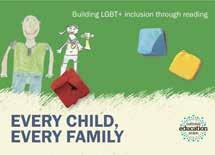
2 minute read
Insulting and unnecessary
Baseline test ‘insulting and unnecessary’
EARLY years teachers feel “insulted,” “patronised” and “resentful” that reception Baseline testing will be introduced in September, according to research commissioned by the NEU.
A survey of more than 1,000 teachers found 77 per cent of early years teachers felt Baseline devalued their professional assessment and judgement.
They told researchers at the Institute of Education (IoE), University College London, that the 20-minute standardised test shows the Government mistrusts their careful and considered professional judgements.
One teacher criticised Baseline testing as: “Soul-destroying… it is not helping me, and I trust my own professional judgement more.” Another said: “The Government should trust teachers, who have a brilliant understanding of how to observe and assess children without the need for formal testing.” The Government is pressing ahead with an England-wide rollout of Baseline, at a cost of around £10 million, despite strong opposition from teachers, leaders and parents and several studies that discredit the test.
The Government intends to hold schools to account for the progress their children make between joining reception and key stage 2 with Baseline testing.
But an expert British Educational Research Association panel has demonstrated that the proposed 2020 Baseline test will produce data that is “flawed, unjustified, and wholly unfit for purpose” and will not lead “Testing turns the settling-in period into drudgery… it kills the joy of playing and learning.”
to accurate or fair comparisons being made between schools.
In addition, 69 per cent of teachers who took part in the IoE research said Baseline had not helped them to develop positive relationships with the children in reception, and 83 per cent said it had added to their workload. “The narrow focus on standardised testing of literacy and numeracy risks turning the settling-in period into drudgery, and kills the joy of playing and learning while creating high levels of stress for both young children and teachers,” says the research report.
NEU policy adviser Ken Jones said: “Early years education has many problems – it is underfunded and understaffed, with many children suffering the effects of poverty.
“Baseline assessment will address none of these problems. It will steer schools and early years settings towards a further narrowing of the curriculum. n Add your name to More Than a Score’s petition against Baseline testing. Visit bit.ly/37yPsP6
Looking back on Section 28 and the struggle for LGBT+ rights
FEBRUARY was LGBT+ History Month.TH e campaign for rights in the education sector gathered pace through the 1980s, with gay and lesbian teachers demanding an end to prejudice inside and outside the classroom (see book cover, pictured left: School’s Out by the Gay Teachers’ Group, 1987).
The campaign hit the headlines in 1988, when teacher Lena Milosevic declared herself a lesbian from the podium at the National Union of Teachers conference (see The rest is history, page 5).
But the following month Section 28 legislation was enacted, banning educators from talking about or even acknowledging homosexuality. It was resisted and finally repealed 12 years later, but the work to undo the damage it caused continues.
The NEU launched comprehensive LGBT+ inclusion guidance in November

2019, along with Every Child, Every Family (pictured above), a reading resource for primary and nursery educators (see neu.org.uk/lgbt-equality). This year we are documenting good practice in LGBT+ inclusion from around the country – email equality@neu. org.uk if you have examples to share. Email us examples of good practice equality@neu. org.uk










